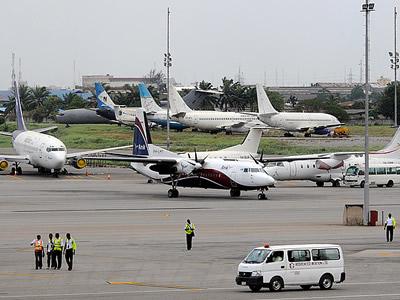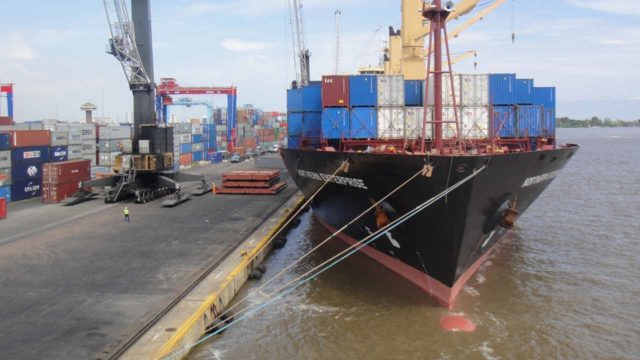Oil Drilling Rig Isn’t A Vessel Under Cabotage Act
 * Appeal Court Rules Against NIMASA
* Appeal Court Rules Against NIMASA
By Kenneth Jukpor
The Court of Appeal sitting in Lagos has ruled that an oil drilling rig is not a vessel and is not engaged in coastal trading (cabotage) within the meaning of Sections 2 and 5 of the Cabotage Act.
The Court which consisted of a panel of three Justices namely; Garba Lawal, Obaseki-Adejumo and Kolawole delivered the judgment in the case of Transocean Support Services Nigeria Limited and three others Vs NIMASA and Minister of Transport (CA/L/503/2016) clarifying the law on whether a rig is a vessel under the Coastal and Inland Shipping (Cabotage) Act 2003.
In a unanimous decision, the Court of Appeal held that an oil drilling rig was not a vessel and was not engaged in coastal trading (Cabotage) within the meaning of sections 2 and 5 of the Cabotage Act. It also held that a drilling rig was not one of the vessels requiring registration pursuant to section 22(5) (m) of the Cabotage Act and consequently that the listing of drilling rigs in paragraph 9.1.1C of the Cabotage Guidelines 2007 as one of the “foreign vessels” eligible for registration and thus liable to pay 2% cabotage surcharge was unlawful and invalid.
Transocean was represented by Prof Fidelis Oditah QC, SAN.
Before the judgment, there was confusion regarding the applicability of the Cabotage Act to drilling rigs (especially jack up rigs and drill ships) and the liability of drilling services providers to contribute 2% of the nominal amount of drilling contracts performed by them into the Cabotage Vessel Financing Fund pursuant to sections 42 and 43 of the Cabotage Act.
The confusion appeared to have arisen in 2007 when the Minister of Transportation purported to issue a guideline for the implementation of the Cabotage Act (Cabotage Guidelines 2007) in which he listed drilling rigs in paragraph 9.1.1C of the Cabotage Guidelines 2007 as one of the “foreign vessels” eligible for registration and thus liable to pay 2% cabotage surcharge.
Pursuant to Cabotage Guidelines 2007, Nigerian Maritime Administration and Safety Agency (NIMASA) appointed debt collection agents whom NIMASA directed to issue cabotage surcharge demands to companies involved in drilling operations in Nigeria. A number of drilling companies challenged the demand notices issued by NIMASA’s debt collectors by issuing legal proceedings against NIMASA.
In the Transocean case, at first instance, Justice Rita Ajumogobia did not address the merits and therefore did not answer the questions whether drilling rigs were vessels, whether they were engaged in coastal trade, and whether they were listed in section 22(5) of the Cabotage Act. Instead she dismissed the proceedings on the basis that they were not issued within 3 months of receipt of the NIMASA debt collector’s demand notices and consequently were statute barred pursuant to section 2 of the Public Officers Protection Act (POPA).
In a unanimous decision, the Court of Appeal reversed her decision and pursuant to section 16 of the Court of Appeal Act (which gave it power to hear the case as if it were sitting as a first instance court), accepted Transocean’s invitation to decide the merits. As stated above, the Court of Appeal decided on the merits that drilling rigs were not vessels under the Cabotage Act and were not engaged in coastal trade while carrying out drilling operations.
The decision of the Court of Appeal in the Transocean case has clarified a very important aspect of Nigerian maritime law. The Court of Appeal accepted Transocean’s arguments that drilling rigs were not vessels under the Cabotage Act, that the definition of “ship” under the Admiralty Jurisdiction Act as including rigs did not assist in the construction of “vessel” under the Cabotage Act as the objects of both legislation differed, that drilling rigs were not engaged in coastal trade and were not listed in section 22(5) of the Cabotage Act among the vessels requiring registration.
Consequently, the extension of the Cabotage Act to drilling rigs by the Transport Minister’s Cabotage Guidelines was an unlawful and invalid exercise of delegated legislative power; paragraph 9.1.1C of the Guidelines exceeded the power to make rules for the implementation of the Cabotage Act and was void. These contentions were accepted by the Court of Appeal.
Justice Obaseki-Adejumo who delivered the lead judgment, stated as follows: “It is therefore abundantly clear that only vessels engaged in coastal trade are liable to pay into the Fund the 2% of the contract sum performed by such vessel. I dare ask, is a drilling rig, like the one owed and/or operated by the Appellants a vessel within the definition under the Cabotage Act? Without any modicum of doubt, by the definition under the Act, a vessel must be designed, used or capable of being used solely or partly for marine navigation and used for the carriage of persons or property on, through or under water without regard to method or lack of propulsion. Unless a drilling rig falls within this definition and/or is expressly stated to be among the machineries contained in section 22(5)(a) -(m), same cannot be deemed to be a vessel eligible for registration under Section 22(1) of the Cabotage Act and liable to pay a surcharge of 2% of the contract sum performed by such vessel engaged in coastal trade.







